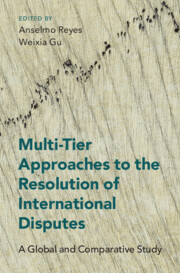Book contents
- Multi-tier Approaches to the Resolution of International Disputes
- Multi-tier Approaches to the Resolution of International Disputes
- Copyright page
- Contents
- Figures
- Tables
- Contributors
- Acknowledgements
- Table of Cases
- Table of STATUTES AND INSTRUMENTS
- Table of Rules, Codes and Guidelines
- Abbreviations
- Part I A Global Overview of Multi-tier Dispute Resolution: Main Themes
- 1 Mapping and Assessing the Rise of Multi-tiered Approaches to the Resolution of International Disputes across the Globe
- 2 A Snapshot of National Legislation on Same Neutral Med-arb and Arb-med around the Globe
- Part II Multi-tier Dispute Resolution in Asia
- Part III Multi-tier Dispute Resolution in the Wider World
- Part IV Conclusion
- Bibliography
- Index
2 - A Snapshot of National Legislation on Same Neutral Med-arb and Arb-med around the Globe
from Part I - A Global Overview of Multi-tier Dispute Resolution: Main Themes
Published online by Cambridge University Press: 09 December 2021
- Multi-tier Approaches to the Resolution of International Disputes
- Multi-tier Approaches to the Resolution of International Disputes
- Copyright page
- Contents
- Figures
- Tables
- Contributors
- Acknowledgements
- Table of Cases
- Table of STATUTES AND INSTRUMENTS
- Table of Rules, Codes and Guidelines
- Abbreviations
- Part I A Global Overview of Multi-tier Dispute Resolution: Main Themes
- 1 Mapping and Assessing the Rise of Multi-tiered Approaches to the Resolution of International Disputes across the Globe
- 2 A Snapshot of National Legislation on Same Neutral Med-arb and Arb-med around the Globe
- Part II Multi-tier Dispute Resolution in Asia
- Part III Multi-tier Dispute Resolution in the Wider World
- Part IV Conclusion
- Bibliography
- Index
Summary
This chapter provides a high-level comparative overview of how states around the world have regulated hybrid processes (med-arb or arb-med) involving the same neutral. Drawing on a database of national mediation and arbitration laws from 195 jurisdictions, it elicits broad regulatory patterns and seeks to determine whether they can be explained by reference to geographic region, legal tradition or a state’s level of development (measured by income level). The findings show that fewer than half of all jurisdictions surveyed legislate around same neutral hybrid processes. Of those that do, most are concentrated in Africa and Asia. Common law jurisdictions are less likely than civil law jurisdictions to regulate in this space, but when they do, they tend to be more thoughtful and innovative.
Although it is often said that combining mediation and arbitration using the same neutral is widely accepted in Continental European, Latin American, and Eastern Asian cultures, this is only somewhat borne out by national legislation. Assuming lawmaking mirrors culture, the study’s findings lend qualified support only to the idea that Eastern Asian cultures are receptive to same neutral arb-med.
- Type
- Chapter
- Information
- Multi-Tier Approaches to the Resolution of International DisputesA Global and Comparative Study, pp. 25 - 66Publisher: Cambridge University PressPrint publication year: 2021



